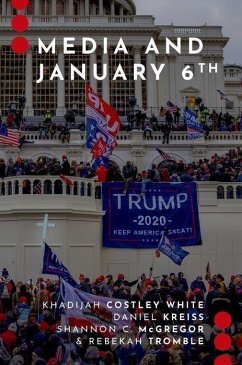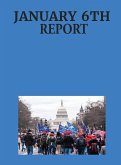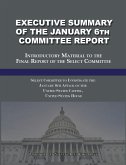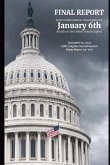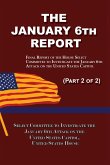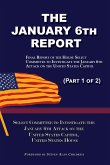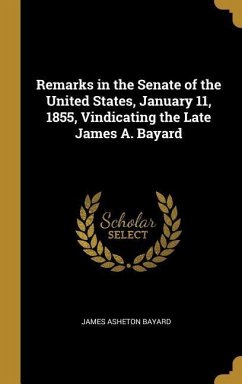Media and January 6th
Herausgeber: Costley White, Khadijah; Kreiss, Daniel
Media and January 6th
Herausgeber: Costley White, Khadijah; Kreiss, Daniel
- Gebundenes Buch
- Merkliste
- Auf die Merkliste
- Bewerten Bewerten
- Teilen
- Produkt teilen
- Produkterinnerung
- Produkterinnerung
The images cast across screens across the country on January 6, 2021, laid bare the fragility of American democracy as the steps and halls of the US Capitol were inundated by a violent band of insurrectionists. Media and January 6th brings together a diverse group of leading scholars to help us more clearly understand the relationship between media and the attempted coup. The volume examines why and how January 6th came to be and the centrality of media to the event. It is organized around three key questions: How should we understand January 6, 2021? What should research look like after January 6, 2021? And how can we prevent another event like this?…mehr
![January 6th Report January 6th Report]() January th House investigation teamJanuary 6th Report22,99 €
January th House investigation teamJanuary 6th Report22,99 €![Executive Summary of the January 6th Committee Report Executive Summary of the January 6th Committee Report]() Select Committee January 6th AttackExecutive Summary of the January 6th Committee Report18,99 €
Select Committee January 6th AttackExecutive Summary of the January 6th Committee Report18,99 €![January 6th Final Report January 6th Final Report]() US House of RepresentativesJanuary 6th Final Report27,99 €
US House of RepresentativesJanuary 6th Final Report27,99 €![The January 6th Report (Part 2 of 2) The January 6th Report (Part 2 of 2)]() Select Committee January 6th AttackThe January 6th Report (Part 2 of 2)19,99 €
Select Committee January 6th AttackThe January 6th Report (Part 2 of 2)19,99 €![The January 6th Report (Part 1 of 2) The January 6th Report (Part 1 of 2)]() Select Committee January 6th AttackThe January 6th Report (Part 1 of 2)19,99 €
Select Committee January 6th AttackThe January 6th Report (Part 1 of 2)19,99 €![Courage Under Fire: Under Siege and Outnumbered 58 to 1 on January 6 Courage Under Fire: Under Siege and Outnumbered 58 to 1 on January 6]() Steven A. SundCourage Under Fire: Under Siege and Outnumbered 58 to 1 on January 623,99 €
Steven A. SundCourage Under Fire: Under Siege and Outnumbered 58 to 1 on January 623,99 €![Remarks in the Senate of the United States, January 11, 1855, Vindicating the Late James A. Bayard Remarks in the Senate of the United States, January 11, 1855, Vindicating the Late James A. Bayard]() James Asheton BayardRemarks in the Senate of the United States, January 11, 1855, Vindicating the Late James A. Bayard28,99 €
James Asheton BayardRemarks in the Senate of the United States, January 11, 1855, Vindicating the Late James A. Bayard28,99 €-
-
-
- Produktdetails
- Verlag: Oxford University Press, USA
- Seitenzahl: 248
- Erscheinungstermin: 11. März 2024
- Englisch
- ISBN-13: 9780197758526
- ISBN-10: 0197758525
- Artikelnr.: 69821643
- Verlag: Oxford University Press, USA
- Seitenzahl: 248
- Erscheinungstermin: 11. März 2024
- Englisch
- ISBN-13: 9780197758526
- ISBN-10: 0197758525
- Artikelnr.: 69821643
2021
Khadijah Costley White
Daniel Kreiss
Shannon C. McGregor
Rebekah Tromble
* SECTION ONE * How should we understand January 6
2021? * 2. It Was an Attempted Coup
The Cline Center's Coup d'État Project Categorizes the January 6
2021 Assault on the US Capitol
Scott L. Althaus
Joseph Bajjalieh
Jay Jennings
Michael Martin
Buddy Peyton
and Dan Shalmon * 3. January 6th and the Boundaries of Protest
Danielle K. Brown * 4. Remembering January 6th: An Insurrection
the Media
and the Shadow of the Tea Party
Khadijah Costley White * 5. "Stop the Steal" and the Racial Legacy of Election Disinformation
Francesca Tripodi * 6. "Fake and Fraudulent" vs. "An American Right": Competing Imaginaries of the Vote in the 2020 U.S. Presidential Campaign
Jennifer Stromer-Galley
Brian McKernan
Christy Khoury
and Pyeonghwa Kim * 7. The Changing American Racial Landscape and January 6th
Andrew Thompson * 8. Identity Distillation: The Engine Driving America's Asymmetrically Sorted Mediated Political Crisis
Dannagal G. Young * 9. January 6th as Logical Extension of Conservative Populism
Paul Elliott Johnson * 10. Anti-democratic Publics: The January 6th Mob and Digital Organizing
Silvio Waisbord * 11. The Ordinary Insurrection: January 6 and the Mainstreaming of Political Violence
Alice E. Marwick * 12. The Anti-Democratic Feedback Loop: Right-Wing Media Responses to January 6
Becca Lewis * SECTION TWO: * What should research look like after January 6
2021? How can we prevent another January 6
2021? * 13. Online Data and the Insurrection
Megan A. Brown * 14. What Can "We" Do?
Reflections on Politics After January 6
Cynthia Burack * 15. Political Communication Research at a Time of Democratic Crises
Daniel Kreiss * 16. It's Not Just the Fruit
It's the Factory Farm: Assessing the Past
Present
and Future of January 6th
Whitney Phillips and Regina Lawrence * 17. Not Just Higher Truths: Critical Inquiry into Conservative Media After January 6th
Anthony Nadler * 18. Rethinking Right-wing Media in the Wake of an Attempted Coup
Yunkang Yang * 19. The Local Roots of January 6th: A Mixed-Methods
Multi-Level Approach to Political Communication
Sadie Dempsey and Jianing Li * 20. Afflicting the Comfortable
Dave Karpf * 21. Taking it to the States
Lewis Friedland * 22. Reparation Through Reporting
Meredith D. Clark * 23. Epilogue
Daniel Kreiss
Shannon C. McGregor
Rebekah Tromble
and Khadijah Costley White.
2021
Khadijah Costley White
Daniel Kreiss
Shannon C. McGregor
Rebekah Tromble
* SECTION ONE * How should we understand January 6
2021? * 2. It Was an Attempted Coup
The Cline Center's Coup d'État Project Categorizes the January 6
2021 Assault on the US Capitol
Scott L. Althaus
Joseph Bajjalieh
Jay Jennings
Michael Martin
Buddy Peyton
and Dan Shalmon * 3. January 6th and the Boundaries of Protest
Danielle K. Brown * 4. Remembering January 6th: An Insurrection
the Media
and the Shadow of the Tea Party
Khadijah Costley White * 5. "Stop the Steal" and the Racial Legacy of Election Disinformation
Francesca Tripodi * 6. "Fake and Fraudulent" vs. "An American Right": Competing Imaginaries of the Vote in the 2020 U.S. Presidential Campaign
Jennifer Stromer-Galley
Brian McKernan
Christy Khoury
and Pyeonghwa Kim * 7. The Changing American Racial Landscape and January 6th
Andrew Thompson * 8. Identity Distillation: The Engine Driving America's Asymmetrically Sorted Mediated Political Crisis
Dannagal G. Young * 9. January 6th as Logical Extension of Conservative Populism
Paul Elliott Johnson * 10. Anti-democratic Publics: The January 6th Mob and Digital Organizing
Silvio Waisbord * 11. The Ordinary Insurrection: January 6 and the Mainstreaming of Political Violence
Alice E. Marwick * 12. The Anti-Democratic Feedback Loop: Right-Wing Media Responses to January 6
Becca Lewis * SECTION TWO: * What should research look like after January 6
2021? How can we prevent another January 6
2021? * 13. Online Data and the Insurrection
Megan A. Brown * 14. What Can "We" Do?
Reflections on Politics After January 6
Cynthia Burack * 15. Political Communication Research at a Time of Democratic Crises
Daniel Kreiss * 16. It's Not Just the Fruit
It's the Factory Farm: Assessing the Past
Present
and Future of January 6th
Whitney Phillips and Regina Lawrence * 17. Not Just Higher Truths: Critical Inquiry into Conservative Media After January 6th
Anthony Nadler * 18. Rethinking Right-wing Media in the Wake of an Attempted Coup
Yunkang Yang * 19. The Local Roots of January 6th: A Mixed-Methods
Multi-Level Approach to Political Communication
Sadie Dempsey and Jianing Li * 20. Afflicting the Comfortable
Dave Karpf * 21. Taking it to the States
Lewis Friedland * 22. Reparation Through Reporting
Meredith D. Clark * 23. Epilogue
Daniel Kreiss
Shannon C. McGregor
Rebekah Tromble
and Khadijah Costley White.

